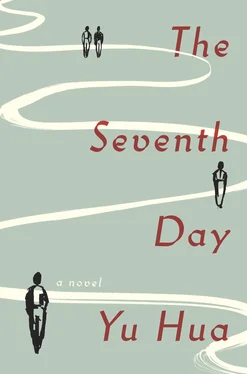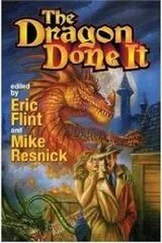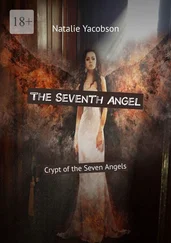It was when I was four that I met the young woman with her hair in a braid. She was three years older than my father. She had missed the scenes of diaper changing and sweater knitting and saw simply a rather cute little boy. She reached out a hand to pet my hair and face, and after I addressed her as “Auntie,” she happily took me in her arms and dandled me on her knee. These friendly gestures settled my father’s nerves and gave him a glimpse of what happy married life could be.
They began to date, in encounters not involving me, I being left on such occasions with Hao Qiangsheng and Li Yuezhen. The dates took the form of evening strolls along the railroad line. My father was a bashful, introspective man, and he would escort his partner back and forth without saying a word. Typically it would be she who broke the silence with a remark or two, and only then would he say something, but often his words were drowned out by the roar of an approaching train.
At first their dates were of short duration; they would end after just one or two turns along the tracks, and then my father would come to collect me. Later, the pair would take five or six turns and keep walking until after midnight, by which time I would be sound asleep alongside little Hao Xia, who was three days older than me. Hao Qiangsheng himself, unable to keep his eyes open, would have lain down in bed and begun to snore. Only Li Yuezhen would be sitting patiently in the outside room waiting for my father to arrive. She would briefly inquire about the progress of the relationship before she let my father carry me off. In those days I would often fall asleep in the evening on the bed in Hao Qiangsheng’s apartment and wake up in bed in my own house.
This situation continued for two months or so, after which Li Yuezhen felt that my father and the young woman were not making any real progress but simply spending more time on their walks. After she questioned my father closely about the nature of their exchanges, she discovered where the problem lay. By the end of the evening, after all their walking, the girl would be tired. She would come to a stop and say “Good night.” My father, not knowing quite what to say, would simply nod, then turn around and head off quickly to Hao Qiangsheng’s apartment to collect me.
“Why don’t you walk her home?” Li Yuezhen asked my father.
“She already said good night,” my father replied.
Li Yuezhen shook her head and sighed. When the girl said good night, she told my father, what she was really hoping was that he would see her home. Seeing his confusion, Li Yuezhen took a firm line. “Tomorrow night,” she instructed, “make sure you walk her home.”
My father was enormously grateful to Li Yuezhen and her husband, for ever since I was born they had never stopped helping the two of us. He followed her advice, silently walking the young woman back to her home after she said good night. Outside her door, in the moonlight, she said good night a second time, and this time she looked radiant.
Their relationship leapt ahead, and now they did not wait until after dark for a surreptitious date but strolled confidently side by side into the park on Sundays. They were now formally in love, and passionately so. They began to meet in the little house that swayed and shook when trains passed, and they probably hugged and kissed, but I suspect they went no further than that.
From dating to full-blown love affair, I was absent from all the proceedings. This reflected Li Yuezhen’s view that for me to join the fun would hinder the normal development of the romance, and my appearance should be delayed until the waters had settled in their course. She believed that so long as this girl truly loved my father, she would naturally accept my existence. During this period I was practically living in Li Yuezhen’s apartment. I liked this family: I had a close bond with Hao Xia, and Li Yuezhen was like a mother to me.
When things got to the point where my father and the young woman were ready to discuss marriage, they had to bring me into the conversation. Earlier, when they were courting so avidly, I hardly figured in their thinking at all. Now my father began to talk about me in detail, starting with how he’d heard my wailing and picked me up off the tracks, and sharing the highlights of my development these past four years. He spoke as a happy father, and a proud one, relating a wealth of anecdotes that revealed how clever I was, for he thought me the smartest child in the whole world.
Never before had he talked for so long, or so volubly. After an hour or so, his intended said to him coolly: “You shouldn’t have adopted this kid — you should have left him with an orphanage.”
My father was speechless. The cheerful glow that lit up his features gave way at once to a stiff, pained expression, and that look of distress, rather than passing quickly, settled on his face for some time. His emotions were in turmoil, for he was now deeply in love with the girl, while loving me, of course, too. These were two different kinds of love, and he needed to choose one and abandon the other.
Actually, the young woman wasn’t really rejecting me out of hand — she was simply being pragmatic. She was twenty-eight, which in those days counted as very late to be single, and it meant she didn’t have many choices of men. In her eyes my father was strong in all department  s — his only drawback was that he had adopted a foundling. She pictured how in the future they would have children of their own, and it seemed to her that fitting me into the family would be an awkward proposition. So that’s why she said what she did: if they didn’t have me to worry about, things would go more smoothly. She wasn’t wrong to think that way: they might well have more than two children, and to have a foundling to care for too would impose a heavy burden on a couple with a limited income. Even so, she still accepted my existence — she just felt that my father should have left me with an orphanage at the outset. She was just saying.
s — his only drawback was that he had adopted a foundling. She pictured how in the future they would have children of their own, and it seemed to her that fitting me into the family would be an awkward proposition. So that’s why she said what she did: if they didn’t have me to worry about, things would go more smoothly. She wasn’t wrong to think that way: they might well have more than two children, and to have a foundling to care for too would impose a heavy burden on a couple with a limited income. Even so, she still accepted my existence — she just felt that my father should have left me with an orphanage at the outset. She was just saying.
My father tended to have a one-track mind, and if an idea that he was set on found obstacles in its way, he would be unable to think of an alternative. And so the idea got fixed in his head that she would never go along with a package deal. Perhaps he was right, for even if she could have brought herself to accept me, in the long run I would have been a flash point for conflict and strife. My father was like a wet towel dripping with emotions: she and I had seized opposite ends of the towel and were wringing it with all our might, and his heart was in torment.
I had no inkling of his struggle and no awareness that now, when my father looked at me, it was with pity and not with joy. If anything, during these days he seemed to be all the more devoted to me. Although I was now steady on my feet, my father would carry me in his arms as though I couldn’t walk properly, and he would put his face close to mine. Always a bit of a penny-pincher, now every day he would buy me two candies, one of which he would slip into my mouth, the other of which he would pop into one of my pockets.
Much as he found it difficult to part from me emotionally, in his mind he was steadily moving in a different direction. Now twenty-five, one way or another my father needed a woman in his life. He loved me, but he needed a woman’s love even more. After much agonizing, he chose her and abandoned me.
Early one morning I woke up to find my father sitting on the bed. He leaned over and said softly, “Yang Fei, let’s go on a train ride.”
Although I had lived four years next to a busy railroad line, I had never once taken a train. I stuck my nose against the windowpane: as the train began to move and I saw the people on the platform quickly receding, I gave a wail of alarm. Then I saw houses and streets retreating rapidly, and fields and ponds as well, but I noticed the farther away things were, the more slowly they retreated.
Читать дальше

 s — his only drawback was that he had adopted a foundling. She pictured how in the future they would have children of their own, and it seemed to her that fitting me into the family would be an awkward proposition. So that’s why she said what she did: if they didn’t have me to worry about, things would go more smoothly. She wasn’t wrong to think that way: they might well have more than two children, and to have a foundling to care for too would impose a heavy burden on a couple with a limited income. Even so, she still accepted my existence — she just felt that my father should have left me with an orphanage at the outset. She was just saying.
s — his only drawback was that he had adopted a foundling. She pictured how in the future they would have children of their own, and it seemed to her that fitting me into the family would be an awkward proposition. So that’s why she said what she did: if they didn’t have me to worry about, things would go more smoothly. She wasn’t wrong to think that way: they might well have more than two children, and to have a foundling to care for too would impose a heavy burden on a couple with a limited income. Even so, she still accepted my existence — she just felt that my father should have left me with an orphanage at the outset. She was just saying.









